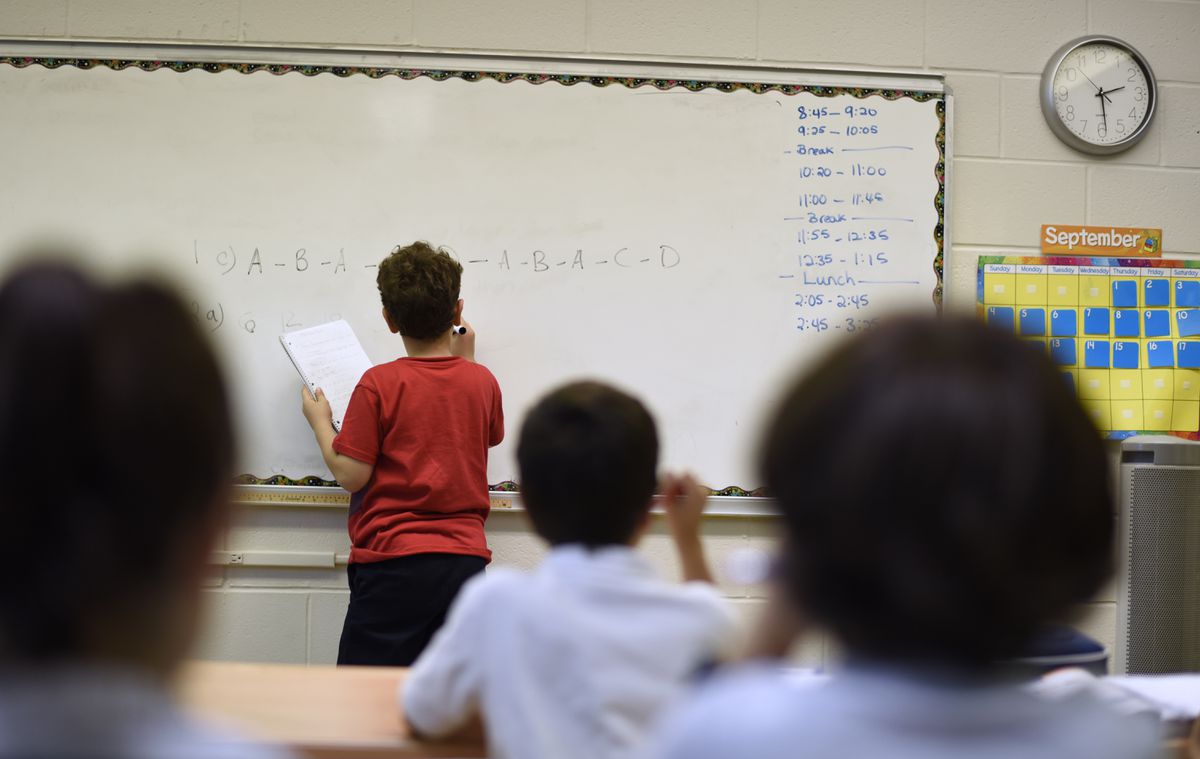
Ontario will become the first province to require student teachers to pass a standardized math test before they receive their teaching licence. FRED LUM/THE GLOBE AND MAIL
Standardized tests for educators do little to advance student achievement in the classroom, according to findings from the agency the Ontario government has directed to develop a math proficiency test for future teachers.
The research review challenging the use of a mandatory teacher test was released late on Wednesday by the Education Quality and Accountability Office (EQAO), and contradicts statements made by Premier Doug Ford’s government that the math assessment will improve teacher confidence and, ultimately, help student performance.
EQAO’s literature review found that while compulsory teacher tests may receive support from policy-makers, educators and the public, “the fundamental goal of these tests – to improve student learning – is often not met.”
“Current research demonstrates that standardized teacher tests are not linked with a level of performance consistency that justifies their widespread implementation at this time,” the agency concluded.
Ontario will become the first province to require student teachers to pass a standardized math test before they receive their teaching licence. Australia and several jurisdictions in the United States mandate standardized teacher testing.
Education Minister Stephen Lecce said the teacher math test, expected to begin in the coming academic year, would continue, despite EQAO’s literature review.
He said in an interview on Thursday that the teacher math test is not being done in isolation. The government is rewriting the elementary math curriculum for next fall, and investing $200-million over four years – $55-million this year – on a math strategy that includes coaches, professional development for teachers and online tutoring programs for students, he said.
“The motivation for this government to do this is predicated on the belief that measuring success is the only way we can understand that the investments we’re making are yielding the results we want for our children,” Mr. Lecce said. “I want to see greater competency, understanding and application of math in the lives of our young people. I want to see our math results rise over time.”
Mr. Lecce said the EQAO review found teacher competency test scores can be positively related to student outcomes. However, EQAO also noted, “almost all these analyses find this correlation to be weak and not universal.” Research showed that teacher experience, the number of postsecondary math courses they took and professional development in the subject were better ways to improve student performance.
Cameron Montgomery, chair of the EQAO, said that the literature review was a “starting point” on what the research is saying on teacher-candidate testing.
“Empirical data that will be collected subsequently will better inform policy and practices in Ontario,” he said in a statement on Thursday.
Math has been a concern in many parts of the country and led to debate about how the subject is being taught in schools. The latest standardized test results for Ontario, released on Wednesday, showed that more and more students in Grades 3 and 6 struggle to meet the provincial standard in math. The provincial standard is equivalent to a B grade.
Earlier this week, The Globe and Mail first reported on the details of Ontario’s plans for a math proficiency test. At least 70 per cent of the test will assess student teachers on content, including fractions, percentages and other arithmetic. The rest of the assessment will test them on how to teach the subject in the classroom, according to a government memo obtained by The Globe.
The research on mandatory teacher testing has found that potential negative impacts could include a decrease in the availability of qualified teachers, especially those from minority groups. The practice may also be detrimental to the curriculum taught to student teachers, as faculties of education may restrict material to teach to the test, according to EQAO. Researchers, the agency said, advised caution “on the basis that these tests are not consistently associated with the positive benefits that are often claimed.”
“Without identifying the best methods to increase student success, creating a restrictive pathway to becoming a teacher may cause more harm than good,” the review stated.
Mary Reid, an assistant professor at the University of Toronto’s Ontario Institute for Studies in Education (OISE), said several universities, including her own, have started introducing courses that teach student teachers math basics, as well as pedagogy. She said the research is clear that it serves as a better way to increase confidence in math and improve student achievement.
“I think it’s a waste of money,” she said of the math proficiency test, “because there’s no empirical evidence that demonstrates any correlation between teacher pass rates and the achievement of their students down the line.”
CAROLINE ALPHONSO
EDUCATION REPORTER
The Globe and Mail, August 29, 2019
